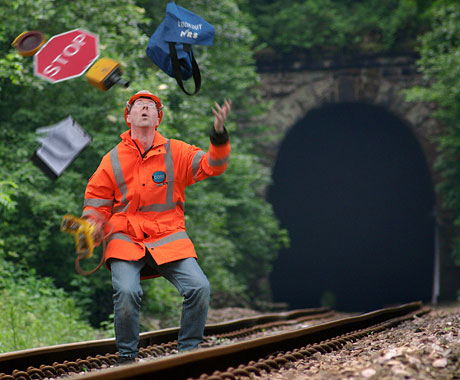|
Unless you’re Bill Gates or a Premiership footballer, £5m is a chunky sum of money. You can do a lot with it. It’s currently funding the construction of defences around flood-prone Hereford, protecting 200 properties from the River Wye. Our understanding of how signals are sent around the human body is being enhanced by research. And, courtesy of some back-of-a-fag-packet calculations, £5m is also the sum to be spent this year on the assessment and recertification of our 22,000 COSSs. We could have a long debate as to which cause is most worthy.
When it brought maintenance in-house, even a ravenous, cash-guzzling monster like Network Rail struggled to stomach its slice of the costly competency cake. So, whilst contractors continued to gorge, NR made its excuses and opted for the much lighter menu of ‘safety in the line’. This placed the onus for overseeing frontline skills onto supervisors. At the time, its Corporate Responsibility Report asserted that this approach “provides far more effective management of safety in the workplace”, though clearly not if you’re a contractor.

The competency cycle for a new COSS takes in a mentoring period, two on-track assessments and a refresher course in the training room. Not unreasonably, recertified COSSs are excused mentoring as well as one of the workplace events. IWA, PC, ES, PICOP and SPICOP all enjoy similar regimes, landing the industry with an annual overall bill of around £10m. Let’s not forget there’s then a gamut of ‘protection assistant’ duties - lookout, handsignaller etc - and 90,000 folk with PTS, all requiring recertification.
As an exponent of the art, COSS is a role close to my heart. Yes, I do have one. Today it’s overloaded by procedural and bureaucratic demands, liberally piled on with little thought for their implications. Many COSSs have lost the ability to plan their own safe systems - an unfortunate consequence of Rimini - whilst others only ever tap into a tiny drop of their vast knowledge tanks. They are however expected to demonstrate competence in every conceivable aspect.
And lots of them struggle. Yes, they’ll clamber over the theoretical hurdles but will then fall flat on their faces when released onto the ballast. Not long ago I heard of a COSS who attended a landslip and didn’t think to block the affected line. Another neglected to tell his workgroup that he had given up the T2 protecting them in order to let a train pass. Such stories run to several volumes.
The big deal here is that, despite the scale of our investment, the less able are still awarded a tick in the box. Something’s wrong somewhere.
There are three areas of weakness. Firstly, as far as ‘the rules’ are concerned, RSSB has failed to show any leadership. Whilst inquiries unearth conflict and confusion, the Rule Book’s ‘independent’ custodian whistles in the wind, inserting extraneous verbiage at the behest of others and tinkering at the edges. It’s time to wipe the slate clean. Down on the ground, there’s a need for simplicity. RSSB should emerge from its cocoon and develop a strategy to deliver it. And that doesn’t mean another cosmetic reshuffle.
|
| ...the Rule Book's 'independent' custodian whistles in the wind, inserting extraneous verbiage at the behest of others... |
|
Secondly, the COSS function has become too broad. Instead of the one-size-fits-all approach, there should be a tighter match of people and needs. Many COSSs only ever do business in an ES’s worksite, so why are they learning about Pee Wee and T12? Indeed, given that shared protection is on offer, is there any benefit having COSSs in a worksite at all? Why isn’t there a ‘COSS-red’ for those who perform all their duties with lookouts?
Narrowing the scope would ease the mind-bending burden of training. Currently a prospective COSS is obliged to spend a week being overwhelmed in the classroom. Then, having done the job for a couple of years, another two days are spent off-the-tools being recertified. It’s spun out to three days for those of us who receive electrical permits, by offering advice on which pocket to keep them in and how best to hold a pencil. This is a valueless, absurd and costly waste of resources.
Finally, there’s the thorny question of aptitude. COSSing isn’t for everyone - it takes confidence, insight and resolve. Rather than exploring these formless qualities, we remain over-reliant on memory tests. How high must a netlon fence be? Which type of T2 uses a TCOD? It’s the easy way out and is in no way a gauge of someone’s skill once they’ve passed through the access gate. Examiners should be empowered to climb inside a candidate’s mind and have a good rummage around.
Reform here offers a rare win-win - sharpening the focus of our safety critical friends whilst clawing back cash by the bucketful. Of course I know from past experience that we’ll end up doing nothing. The railway’s appetite for change is rarely whetted by grand schemes as they’re notoriously difficult to deliver. And if that leaves us managing the fallout from floundering practitioners, so be it.
Story added 1st March 2008
|